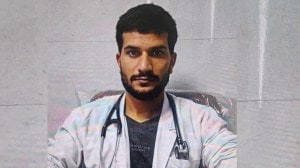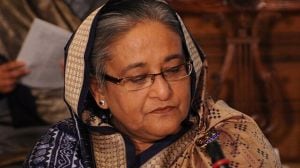Gujarat sees a different Modi: he moves quickly, calls for calm, and the Army
In the 24 hours since the bombings, Gujarat has been witness to a very different side of the Modi administration.

In the 24 hours since the bombings, Gujarat has been witness to a very different side of the Modi administration. There has been no rhetoric, no rabble-rousing, no talk of Gujarat Asmita, in fact no talk anywhere of any backlash.
Proving critics wrong and moving swiftly, the Chief Minister and his team got down to work almost immediately after the blasts — he went on air, appealing for restraint and calm, while his government got in touch with the Army within half-an-hour of the first explosion.
Modi described the terror strikes as “an attack on humanity” while Minister Jay Narayan Vyas chose to call it “an attack on India”. The BJP too has shown restraint, very unlike February 2002 when, in the wake of the torching of the Sabarmati Express that killed 57 kar sevaks, it called a bandh which was supported by the state government.
In 2002, the bandh sparked off violence and the Modi government delayed taking a decision on calling in the Army — the first columns reached Ahmedabad 48 hours after the train carnage sparked off retaliatory violence.
But on Saturday, the state government contacted the Army within half-an-hour of the first blast. Top police sources said that at the high-level meeting held at the Ahmedabad Police Commissioner’s office, the Chief Minister’s instructions were very clear: “There should be no reaction.” It was the same Modi, who in the midst of the Godhra riots, said: “Every action has an equal and opposite reaction.”
But this time, by late evening, 24 companies of the State Reserve Police (SRP) were mobilised along with five companies of the border wing of the Home Guards, and four companies of the Rapid Action Force (RAF) to prevent any retaliatory violence.
Recalling the sequence of events, a senior Home official said that within an hour of the first bombing, Gujarat Chief Secretary Manjula Subramaniam and Union Home Secretary Madhukar Gupta were on line on the issue of military support. By midnight, requisition orders were issued by Secretary (Law and Order) G C Murmu for the Army to be deployed. By sunrise, two Army columns were staging a flag march through the affected areas of Ahmedabad.
Modi was also quick to establish contact with Prime Minister Manmohan Singh and Union Home Minister Shivraj Patil. “Any backlash is something the CM can ill-afford after the profile he has attained,” said a top bureaucrat. The stakes, he said, are very high.
In the last couple of years, the situation on the business and development front in Gujarat has shown a dramatic change. At the January 2007 inaugural of the Vibrant Gujarat Investment Summit, Ratan Tata even said “one is stupid if not investing in Gujarat”.
That is something the Gujarat government doesn’t want upset. “The CM surely does not want to lose momentum,” said an official. Those close to Modi, say the government reaction was comparable to what it did during the 2006 dargah demolition issue in Vadodara. Then, as now, Modi was quick to requisition the Army and underline his government’s seriousness, visiting the Muslim victims of the riots.



- 01
- 02
- 03
- 04
- 05




























